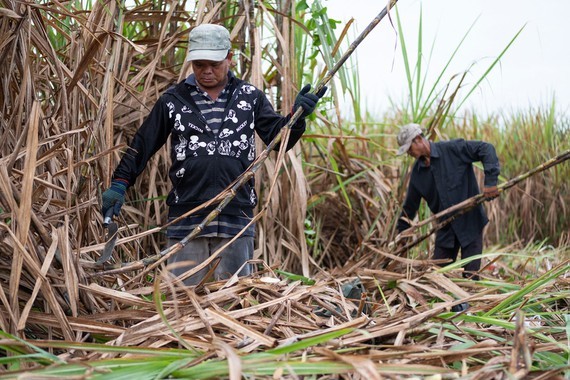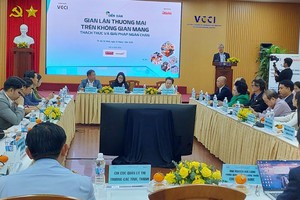
Starting from this year, Vietnam is going to implement the ASEAN Trade in Goods Agreement (ATIGA). Accordingly, sugar products from countries in the ASEAN imported into Vietnam will not be imposed quotas so there is a high possibility that the price of imported sugar will be cheaper than the domestic one. Moreover, the domestic sugar industry has been always facing difficulties because of smuggled sugar so this is expected to be a rough year for the domestic sugar industry.
Last year, Thailand exported more than 1 million tons of sugar to Cambodia but only 200,000 tons of sugar were consumed here so the rest 800,000 tons of sugar might be smuggled into Vietnam. On average, Vietnam needs 1.45 million tons of sugar annually which can be provided sufficiently by the domestic sugar industry. However, cheap smuggled sugar competes with domestic sugar, hurting the domestic sugar industry.
At a meeting on prevention of sugar smuggling, Mr. Truong Van Ba, Deputy Chief of the Standing Office of the National Steering Committee for Combating against Smuggling, Commercial Frauds and Counterfeit Goods, admitted that smuggling and transporting goods through the border still tended to increase and the methods were more and more sophisticated. After being transported successfully into Vietnam, smuggled sugar will be disguised as Vietnamese-made products then sold to the market. Another form of clear smuggling is that enterprises participate in sugar auctions and make an extremely high bid to buy sugar in the liquidations of smuggled sugar; after getting the auction profile, they will rotate this profile for other batches of smuggled sugar.
Amid the context that the sugar industry has been under lots of pressure from the increasing and unstoppable trade fraud and sugar smuggling, besides general advantages, participating and implementing of the ATIGA also create huge stress on the domestic sugar industry.
Mr. Cao Anh Duong, Chairman of the VSSA, said that in Thailand, Indonesia, and the Philippines, although they have removed tariffs and quotas, sugar imported into their countries has to wait at warehouses instead of selling freely at domestic markets if authorities have not given permission. At the same time, many countries also put up technical barriers via regulations, licenses, and fees to ensure that sugar imported from the ASEAN is free from customs clearance but hard to penetrate into distribution and consumption channels or to trade and use in domestic markets. Some countries even have support policies for the sugar industry hidden in the policies that seem to give unspecific support, such as research and development. Therefore, the cost price of their sugar is extremely low.
To ensure for farmers to be able to sell sugarcane to sugar refineries and collect their money, the VSSA proposed the State to temporarily regulates that all types of sugar imported after January 1 this year must be sent to bonded warehouses or warehouses. Imported sugar is only allowed to put in circulation, distribution, and consumption in the domestic market after sugar made from domestically-grown sugarcanes has been sold out and is granted by relevant authorities for each period with specific time and quantity.
Most of the smuggled sugar was sent to factories and enterprises for packing before entering the market. To manage the sugar production accurately and prevent smuggled sugar, Mr. Dang Phu Quy, a member of the Management Board of Quang Ngai Sugar Company, suggested it is necessary to require traceability from sugarcane growers to sugar refineries to reckon the total domestic sugar output. The Ministry of Agriculture and Rural Development collects figures from sugar plants across the country to calculate the total sugar output, creating favorable conditions in monitoring importing of sugar of commercial enterprises, as well as monitoring smuggled sugar.
Mr. Cao Anh Duong suggested that the Ministry of Industry and Trade should establish a committee-based consultation mechanism to give objective advice on balancing sugar supply and demand and recommend a reasonable price level. Every year, this committee will calculate and recommend the buying price of sugarcane which should not be higher than those of farmers in the ASEAN. At the same time, it is essential to carry out non-tariff measures and technical barriers to ensure good and quality domestic sugar production. The activities to split, mix and pack sugar should be listed as conditional business activities. The auctions of smuggled sugar should only be participated by the members of the VSSA.
Last year, Thailand exported more than 1 million tons of sugar to Cambodia but only 200,000 tons of sugar were consumed here so the rest 800,000 tons of sugar might be smuggled into Vietnam. On average, Vietnam needs 1.45 million tons of sugar annually which can be provided sufficiently by the domestic sugar industry. However, cheap smuggled sugar competes with domestic sugar, hurting the domestic sugar industry.
At a meeting on prevention of sugar smuggling, Mr. Truong Van Ba, Deputy Chief of the Standing Office of the National Steering Committee for Combating against Smuggling, Commercial Frauds and Counterfeit Goods, admitted that smuggling and transporting goods through the border still tended to increase and the methods were more and more sophisticated. After being transported successfully into Vietnam, smuggled sugar will be disguised as Vietnamese-made products then sold to the market. Another form of clear smuggling is that enterprises participate in sugar auctions and make an extremely high bid to buy sugar in the liquidations of smuggled sugar; after getting the auction profile, they will rotate this profile for other batches of smuggled sugar.
Amid the context that the sugar industry has been under lots of pressure from the increasing and unstoppable trade fraud and sugar smuggling, besides general advantages, participating and implementing of the ATIGA also create huge stress on the domestic sugar industry.
Mr. Cao Anh Duong, Chairman of the VSSA, said that in Thailand, Indonesia, and the Philippines, although they have removed tariffs and quotas, sugar imported into their countries has to wait at warehouses instead of selling freely at domestic markets if authorities have not given permission. At the same time, many countries also put up technical barriers via regulations, licenses, and fees to ensure that sugar imported from the ASEAN is free from customs clearance but hard to penetrate into distribution and consumption channels or to trade and use in domestic markets. Some countries even have support policies for the sugar industry hidden in the policies that seem to give unspecific support, such as research and development. Therefore, the cost price of their sugar is extremely low.
To ensure for farmers to be able to sell sugarcane to sugar refineries and collect their money, the VSSA proposed the State to temporarily regulates that all types of sugar imported after January 1 this year must be sent to bonded warehouses or warehouses. Imported sugar is only allowed to put in circulation, distribution, and consumption in the domestic market after sugar made from domestically-grown sugarcanes has been sold out and is granted by relevant authorities for each period with specific time and quantity.
Most of the smuggled sugar was sent to factories and enterprises for packing before entering the market. To manage the sugar production accurately and prevent smuggled sugar, Mr. Dang Phu Quy, a member of the Management Board of Quang Ngai Sugar Company, suggested it is necessary to require traceability from sugarcane growers to sugar refineries to reckon the total domestic sugar output. The Ministry of Agriculture and Rural Development collects figures from sugar plants across the country to calculate the total sugar output, creating favorable conditions in monitoring importing of sugar of commercial enterprises, as well as monitoring smuggled sugar.
Mr. Cao Anh Duong suggested that the Ministry of Industry and Trade should establish a committee-based consultation mechanism to give objective advice on balancing sugar supply and demand and recommend a reasonable price level. Every year, this committee will calculate and recommend the buying price of sugarcane which should not be higher than those of farmers in the ASEAN. At the same time, it is essential to carry out non-tariff measures and technical barriers to ensure good and quality domestic sugar production. The activities to split, mix and pack sugar should be listed as conditional business activities. The auctions of smuggled sugar should only be participated by the members of the VSSA.
























